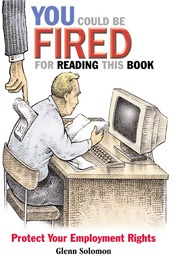You Could Be Fired for Reading This Book
Protect Your Employment Rights
Glenn Solomon (Author)
Publication date: 05/01/2004
As employment law attorney Glenn Solomon explains, the overwhelming majority of Americans are subject to "at-will" employment: they are hired-and can be fired-at their employer's will. While there are a few specific kinds of discriminatory termination (based on age, sex, race, etc.) prohibited by law, it is difficult to prove such discrimination in court.
Solomon argues that the at-will rule is inherently unjust, since it leaves the livelihood of most Americans subject to their employers' whims. How can workers fight back? Drawing on his two decades of legal experience, Solomon discusses in detail four exceptions to the at-will rule, critiquing their effectiveness and explaining precisely how workers might be able to take advantage of them. He describes how workers can leverage what few rights they do have under the existing system, including what to consider when deciding whether or not to sue your employer and what to expect if you do decide to sue, using an actual wrongful termination case to illustrate. And he recommends an alternative to the at-will rule that protects the rights of both workers and employers.
- The rulebook for the game of work that describes how one rule, the at-will rule, trumps all the other rules and can undermine your economic security and your other employment-related rights
- Explores what options exist for getting around the at-will rule and for combating unjust "at will" terminations and presents a viable alternative that more fairly balances the rights of workers and employers
- Written by an employment lawyer with many years of experience representing both employees and employers
Find out more about our Bulk Buyer Program
- 10-49: 20% discount
- 50-99: 35% discount
- 100-999: 38% discount
- 1000-1999: 40% discount
- 2000+ Contact ( bookorders@bkpub.com )
As employment law attorney Glenn Solomon explains, the overwhelming majority of Americans are subject to "at-will" employment: they are hired-and can be fired-at their employer's will. While there are a few specific kinds of discriminatory termination (based on age, sex, race, etc.) prohibited by law, it is difficult to prove such discrimination in court.
Solomon argues that the at-will rule is inherently unjust, since it leaves the livelihood of most Americans subject to their employers' whims. How can workers fight back? Drawing on his two decades of legal experience, Solomon discusses in detail four exceptions to the at-will rule, critiquing their effectiveness and explaining precisely how workers might be able to take advantage of them. He describes how workers can leverage what few rights they do have under the existing system, including what to consider when deciding whether or not to sue your employer and what to expect if you do decide to sue, using an actual wrongful termination case to illustrate. And he recommends an alternative to the at-will rule that protects the rights of both workers and employers.
- The rulebook for the game of work that describes how one rule, the at-will rule, trumps all the other rules and can undermine your economic security and your other employment-related rights
- Explores what options exist for getting around the at-will rule and for combating unjust "at will" terminations and presents a viable alternative that more fairly balances the rights of workers and employers
- Written by an employment lawyer with many years of experience representing both employees and employers









